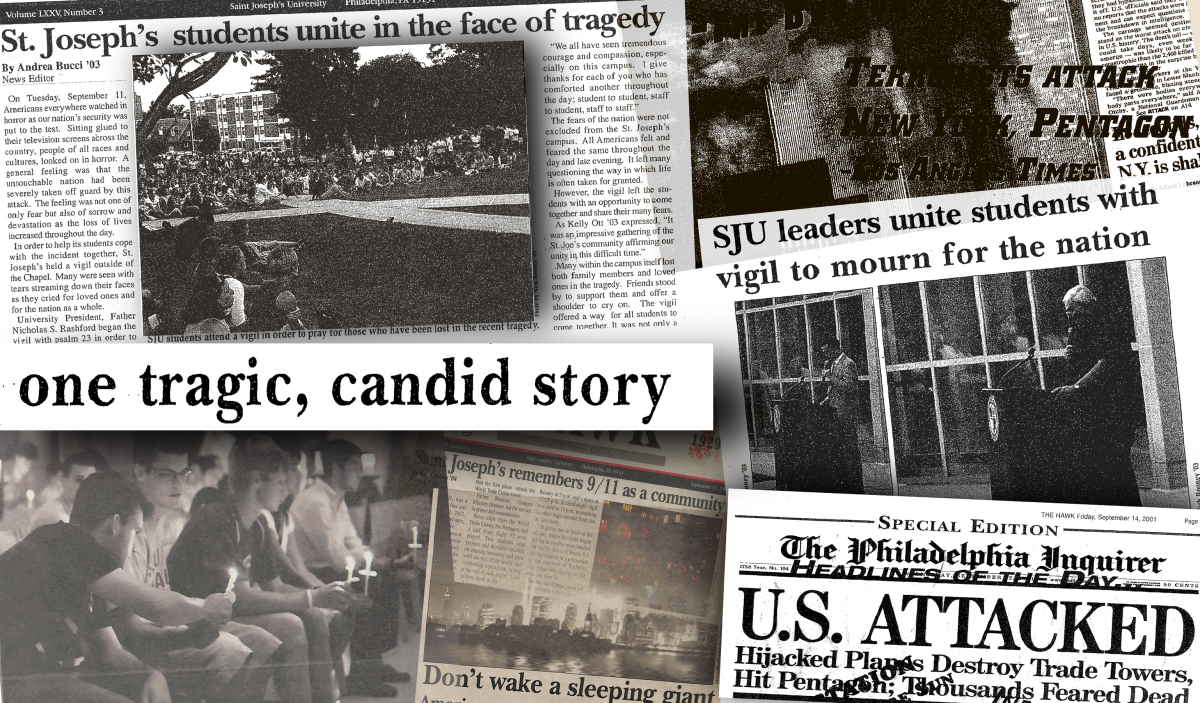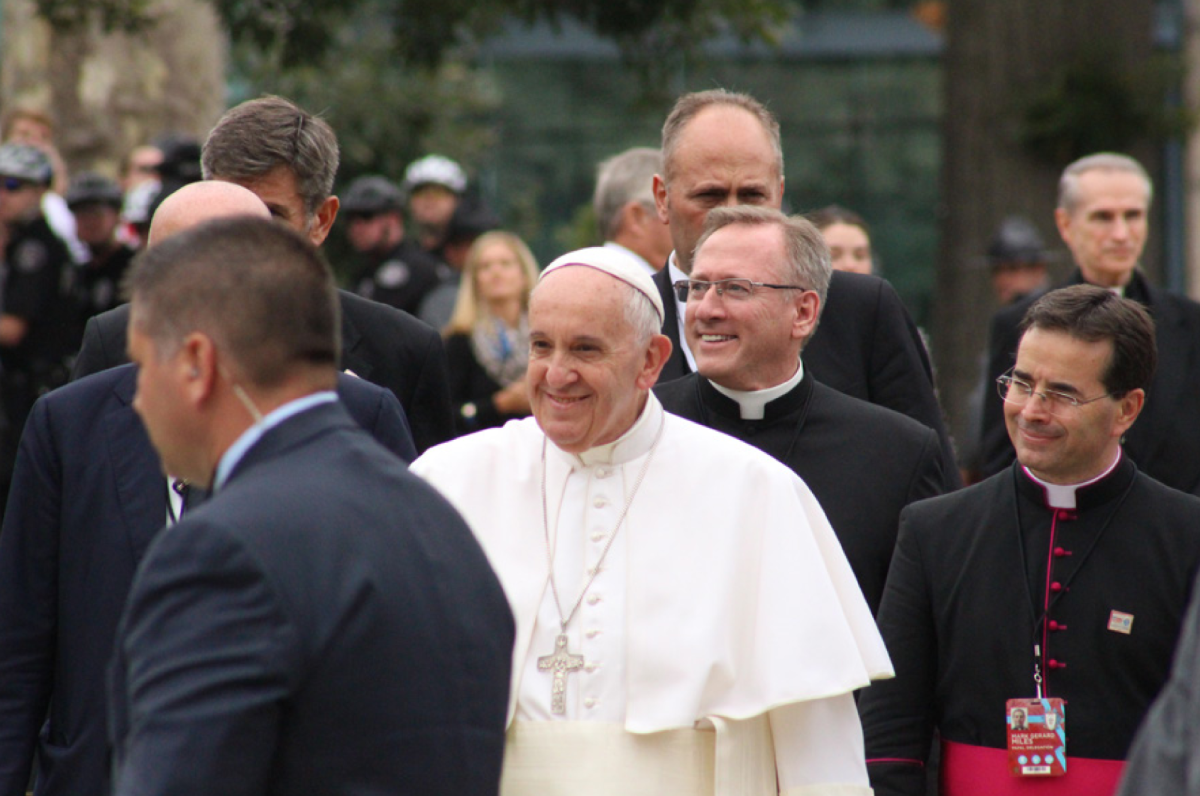The morning of Sept. 11, 2001, Joseph DiAngelo ’70, dean of the Haub School of Business, was in a weekly university cabinet meeting with other top level administrators in Regis Hall.
There was a knock at the door. It was Joe Lunardi ’87, then the university’s director of media relations, who told the group that a second plane had flown into the south tower of the World Trade Center in New York City. They hadn’t even known about the first plane.
“Chills ran up and down our spines,” DiAngelo said. “We went into emergency mode, and all of us went back to our offices to start connecting with faculty and students.”
DiAngelo said administrators opened the Wolfington Teletorium in Mandeville Hall to give people a place to gather.
“We brought as many people as we could into the Teletorium because we thought it was best for everybody to be together,” DiAngelo said. “We stayed there most of the day.”
Jo Alyson Parker, Ph.D., professor emerita of English, was in her office in Bellarmine Hall preparing for class when she got an email from Bill McDevitt, Ph.D., professor emeritus of management. The subject of the email was “a tragedy.” McDevitt wrote in the email that a plane had hit one of the World Trade Center towers.
Parker left her office to watch what was happening on a television set in a nearby classroom.
“By the time I got out to look at the television, the two towers had been hit,” Parker said. “It was just such a stunning sight. And my students were just dumbfounded and horrified. We were watching it, trying to process what was going on.”
Paul Aspan, Ph.D., associate professor and chair of theology and religious studies, remembered the TVs in Bellmarine, too. He had taught an 8 a.m. class in McShain Hall on Sept. 11 and was walking back to his office in Bellarmine Hall when a student stopped him to ask if he had heard a small plane hit one of the World Trade Center towers.
Parker had imagined a small plane when she first heard the news, too.
Back in Bellarmine Hall, Aspan watched the news with a colleague on a TV in one of the classrooms and learned the full scale of the disaster.
“I don’t remember exactly if an announcement went out to stop holding classes, but I think everything stopped of its own accord,” Aspan said.
Parker later attended a prayer service at the Chapel of Saint Joseph, where members of the university had been invited to gather during free period that day.
“Bunches of us, students, faculty, staff, went over to the chapel, and we were invited to name people we wanted there to be prayers for because people didn’t know if someone they knew in New York in that area was safe,” Parker recalled. “What you heard throughout the chapel were people just calling out the various names of people they knew. It was just such a sobering experience for all of us.”
Nancy Fox, Ph.D., professor of economics, remembered the community gatherings on campus but also the weight of uncertainty that hung over the day.
“I remember being torn, like, I’m a professional, I should be here to support my students,” Fox said. “But I couldn’t get through to the school where my kids were. Nobody knew what was going on. Nobody knew.”
In the two decades since the attacks, talking to students about 9/11 in the classroom has changed, in part because many undergraduate students were not alive in 2001, or were just babies and toddlers. Their memories of 9/11 come from others.
“Our first-year students have no understanding of how impactful it was,” Parker said.
In the years following the attacks, Aspan started planning a course that he began teaching in 2012 titled Religion, Violence and Terrorism. He will teach the course again next spring.
Aspan said over the past 20 years, he recognizes how his frame of reference for 9/11 differs between him and his students.
“The last few times I’ve taught the course, students either weren’t alive yet or weren’t alive long enough to have any memories of the day,” Aspan said. “And so that made it–it sounds cold and I don’t mean it to be cold–but it made it a case study among the many different case studies that we would go through in a semester, and occasionally stories would percolate up through an aunt and uncle.”
This is exactly the case for Liz Cartier ’23.
Liz Cartier lost her uncle, an electrician in the South Tower, when he was trying to evacuate from the 105th floor.
“His siblings spent weeks trying to find if there was any information out there,” Cartier said. “They worked on ground zero. They did a lot of stuff to make sure that all the victims were okay, but they couldn’t find him.”
Despite not being able to recall the exact events of Sept. 11, Cartier said she and her family commemorate her uncle’s death every year at ground zero.
“I remember going to New York City every single year and [my dad] would do a memorial service at the cemetery,” Cartier said. “We were doing a lot of things to commemorate him and always cherish his legacy. I remember meeting a lot of people who tell me stories about my Uncle James.”
Angela Christaldi ’17 was in first grade on Sept. 11, 2001. While Christaldi doesn’t remember much of that day from her own memory, she has heard the story about her father, an Amtrak conductor, who worked to get people out of New York City.
“I could have lost him that day if something else had gone wrong,” Christaldi said. “It puts a lot of things in perspective.”
Christaldi said she is grateful to have her father with her, but as she reflects on the day, she recognizes how the attacks on 9/11 continue to impact people around the world through war and racism against those of Middle Eastern descent.
“There are so many people who did lose loved ones in the initial event, but [also] continuing through the years with all of the health problems that being in the area caused, and from the war in Iraq and Afghanistan,” Christaldi said.
For Lisa Baglione, Ph.D., professor of political science, that is one of the starkest of the lingering effects of 9/11. Baglione was off campus that day, on unpaid maternity leave, but she saw the towers fall on TV at home with her 4-month-old and 3-year-old.
“We alienated a lot of people around the world. We were attacked, but for many people, the reply ended up creating new problems for the United States, new enemies and new terrorist cells,” Baglione said.









































